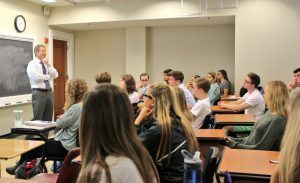Dr. Shankar Bhamidi's first year seminar gets a visit from the Dean
September 28, 2016
Every year the STOR department offers a number of First Year Seminars. These are meant to introduce incoming first year students to cutting edge research in the disciplines of STOR. This year Dr. Shankar Bhamidi is teaching a course called “Risk and Uncertainty in the Real World”. As part of the course, Prof. Bhamidi occasionally gets distinguished researchers who are using state of the art techniques in statistics and probability in their own research. This week we had Prof. Kevin Guskiewicz, the dean of the College of Arts and Sciences and Kenan distinguished professor in the department of Exercise and Sports Science come give a talk to the class (see the picture below) on the fundamental work his lab and department have conducted on concussion and traumatic brain injury among athletes.
Brief Bio of Prof. Guskiewicz, paraphrased from the UNC College of Arts and Sciences webpage:
Dr. Kevin Guskiewicz, a neuroscientist and nationally recognized expert on sport-related concussions, became dean of the College of Arts and Sciences on Jan. 1, 2016. Previously, he had served as senior associate dean for the natural sciences and chair of the Department of Exercise and Sport Science in the College.
A 20-year member of Carolina’s faculty, Guskiewicz is the Kenan Distinguished Professor of Exercise and Sport Science and co- director of the Matthew Gfeller Sport-Related Traumatic Brain Injury Research Center and director of the Center for the Study of Retired Athletes. He holds appointments in the department of orthopaedics, department of physical medicine and rehabilitation, the UNC Injury Prevention Research Center and doctoral program in human movement science.
His research has also influenced concussion guidelines and recommendations made by these organizations as well as the NCAA and the NFL. In 2011, he was awarded a prestigious MacArthur Fellowship for his innovative work on the diagnosis, treatment and prevention of sport-related concussions. He and his colleagues used that award to help improve safety in high school sports and to help the U.S. military identify and treat serious head injuries. In 2013, Time magazine named him a Game Changer, one of 18 “innovators and problem-solvers that are inspiring change in America.”
